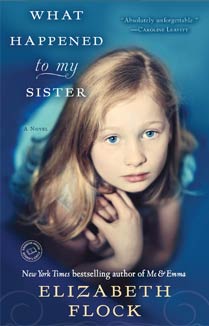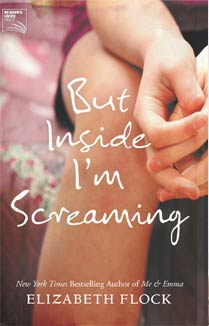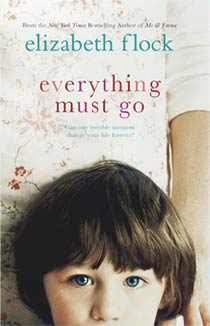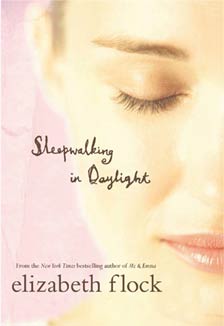Elizabeth Flock is a popular book club speaker and has already joined in nearly four hundred discussions. She would be happy to participate in your reading group get-together, either by speakerphone, Skype, iChat, or in person, depending on your location. Please visit the “Contact” page and send along your request (including the date, time, and location of your upcoming meeting).
Reading Group Guide Questions
- The mother-daughter relationship is an important theme in this novel. What lessons can be learned from Libby and Carrie, and from Honor and Cricket?
- Why do you think Elizabeth Flock chose to narrate the story from Carrie’s and Honor’s points of view? How would the novel differ if it were told through the eyes of Cricket? Of Ruth?
- Honor’s relationship with Cricket is very different from Eddie’s relationship with Cricket. Do you think that father-daughter relationships are inherently different from mother-daughter relationships? If yes, how so?
- What are the characteristics of a strong mother-daughter relationship? Do you think that Honor and Cricket have a strong relationship? What in their relationship works? In what ways do you think Honor approaches motherhood differently than Ruth does?
- Discuss Carrie’s relationship with Cricket. How are the two girls alike? How are they different?
- The death of a child has a devastating impact on parents, and the death of Caroline was one of the main reasons that Eddie and Honor separated. What do you think would have happened to Eddie and Honor if Carrie hadn’t come into their lives?
- Libby seems to put all of her needs before Carrie’s. Do you think that she was always like this? Or was there a time when she was good to Carrie? Is Libby’s act of confession at the end a sacrifice for her daughter, or is it a selfish act?
- Carrie’s flashbacks hint at what really happened to Emma. At any point before the ending, did you guess the truth? What surprised you most?
- Ruth kept alive the dream that she was related to Charlie Chaplin for many years. Is her behavior in any way similar to Carrie keeping alive the dream that her mother cared about her? And that her “good” behavior could influence her mother’s moods? Have you ever wanted something so much that you held out false hope? What are the benefits or consequences of fooling ourselves?
- After losing her first child, Honor has a desperate need to keep control in her life. How does Carrie ease Honor’s need for control?
- Can you imagine living in a world like Carrie’s? Do you think that you would be able to be as resourceful and optimistic as she?
- In this book, Mr. Burdock is the one of the only positive male figures in Carrie’s life. Do you think that he should have called Child Protective Services when he saw that Libby wasn’t really looking after Carrie? How do you define the line between minding your own business and stepping in to help someone?
- Do you feel differently about Mr. Burdock’s inaction versus the Dressers’ overreaction? If Honor and Eddie hadn’t been wrongly accused of child abuse, do you think that they would have been quicker to intervene in Carrie’s situation? Or do you think that Honor made the right decision by feeding and helping Carrie as much as she did?
- Did Carrie’s unfamiliarity with modern technology make you think about how much of the way we live our lives has changed over the past few years? How would this story be different if it was set in a time without the internet? Do you think that Carrie would ever have learned the truth about her family?
- Elizabeth Flock extensively researched child psychology and trauma in order to portray Carrie in a realistic way. Though Carrie is never officially diagnosed or labeled with a psychological condition, how did you interpret her character? Why do you think the author refrained from labeling her in the novel?
- Does your opinion of Isabel change at all as you read more about her illness and how other people—Alex, her parents—may have affected or contributed to her mental state?
- Early on in the novel, Isabel attempts suicide, and we learn that it’s not her first failed attempt. Do you think Isabel genuinely wants to die?
- Many women in abusive relationships have a difficult time acknowledging that a problem exists, and often stay in the relationship rather than leave. What do you think it says about Isabel that she does not leave Alex sooner? What is his role, if any, in Isabel’s mental decline?
- What are your thoughts about Isabel’s observations about her fellow patients at Three Breezes? To what extent, if any, do these people seem “crazy” to you? Are you able to see any similarities in your own habits or actions?
- In many ways, Isabel is just as normal as the rest of us. For instance, when she first arrives at Three Breezes, she reacts as any of us would at the nurses’ violation of her personal belongings. At what points do you see true psychosis displayed in Isabel’s behavior and attitude?
- There seems to be a trend for children to blame their parents for problems they have as adults. How do you feel about Isabel’s parents? Do you believe that they honestly contributed to her emotional state, or are they just convenient scapegoats? Do you find their reaction to their daughter to be too harsh, too cold? Or can you sympathize with their impatience and frustration, or find caring in how they ultimately deal with her?
- Isabel’s emotional reaction to her brothers stomping on anthills—imagining the ants inside are trapped and suffocating to death—has a strong parallel to her stay at Three Breezes. In what other ways is Isabel like the ants she tried to save?
- Discuss the dichotomy between Isabel’s “normal” life in the public eye as a well-known journalist and her life as a patient where she has no celebrity, no reputation and no power.
- The author deliberately does not tie up loose ends when the story is over. What do you think happens after we leave Isabel?
- How relevant is the title, But Inside I’m Screaming, to your life? What are you screaming about? What would happen if you verbalized that scream?
- In the opening quote from Walt Whitman’s Leaves of Grass it reads, “It is by ourselves we go down to eternal light.” Why do you think the author chose this passage? How does it relate to Me & Emma?
- Discuss the effects Daddy’s murder has the various characters – Carrie, Emma, Momma, Gammy. Compare and contrast Carrie and Momma’s lives and personalities before and after Daddy’s murder.
- As little children we tend to believe our parents are perfect and it is only as adults we begin to see their human flaws. How does that affect us? To Carrie, her Daddy was the perfect father. But in reality he was not the perfect husband. What do we learn about Daddy and the reason for his murder? How do you think this affects Carrie?
- The author is careful not to reveal what year or decade the novel is set. When do you think this story is supposed to take place? On what clues did you base your decision?
- Do you think Carrie is typical of girls her age? In what ways? How does she differ?
- Momma, Miss Mary, Gammy and Miss Ueland are all products of a similar social and economic environment. What do you think about the roles of these women in this story? How has circumstance differentiated them? What does each of them represent to Carrie?
- In chapter 8, during a violent scene with Carrie, Richard begins to cry. What is the catalyst for his breakdown? Do his emotions make him more human? Did you find yourself more sympathetic towards him?
- Based on Mr. White’s memories of Momma, what is your impression of Momma as a teenager back in high school?
- Momma seems not to care about the abuse Carrie suffers, yet some might argue that she was as much a victim as her daughter. Discuss ways in which Momma tries to protect Carrie from Richard.
- Carrie is a very sympathetic character, yet there are times when her actions make her unlikable (when she kicks Brownie, for instance.) What do you think this says about her? What so you think about the way children are portrayed in the story? Consider Carrie and Emma, Orla Mae, Forsyth, George Godsey. Are these realistic characters?
- What do you think the future holds for Carrie and Momma? Do you see the ending as hopeful or bleak?
- In the beginning of the book, young Henry witnesses a bird’s death. What significance does this play? Is there a metaphor that might be drawn from this scene?
- Henry’s hometown appears to be an idyllic place to grow up. What kind of place would it be for a young adult? Do you think Henry regrets staying in his small town?
- What, if anything, do you think Henry’s father has to do with the life Henry goes on to lead? Compare the life lessons Henry might have learned from his mother and his father that affect him as an adult.
- Henry’s brother, Brad, left home at a young age and seemed to have no problem moving on from his family. Why do you think Henry feels the need to stay, and did he have a choice? What would you have chosen to do in similar circumstances?
- How does Henry’s relationship with Cathy go so wrong? Do you think it was his mother’s fault, or were there other factors that contributed to its demise?
- Much of Henry’s inner thoughts and feelings are manifested in his fantasy world. Why do you think Henry “escapes” this way? What do you think his fantasy of being a famous musician or athlete says about him? What evidence from his make-believe interviews supports your opinion?
- Why do you think the author set the end of the book on September 10, 2001—the day before the World Trade Center tragedy?
- The author deliberately leaves the ending of the book open to the reader’s imagination. What do you think will happen to Henry after we leave him? Will he stay in his hometown? Do you think he stays with Celeste?
- In her two previous novels, the author chooses psychological issues as her primary focus. In Everything Must Go, what is at play not only with Henry but with his parents and brother?
- Sleepwalking in Daylight opens with a very provocative look at sex and the modern marriage. Where do you think sex ranks in terms of importance in a marriage?
- Do you believe there is a greater amount of dissatisfaction in today’s marriages than there was in the past? What role do you think people’s expectations play in the success or failure of their relationships?
- Statistics show that more and more women are marrying later in life. Do you think couples who marry after age thirty have a better chance of having a successful marriage than those who marry young, as Samantha and Bob did?
- When do you think Samantha started to lose her connection with Cammy? If her relationship with Bob had been on better footing, do you think Samantha would have let her daughter withdraw as much?
- Do parents ever really know their kids? We like to think so, but when it comes to independent teenagers, can we be sure? How confident are you that you would know whether or not your child has tried alcohol and/or drugs, and what would you do if they had?
- It can be very easy for us to blame the parents for a child’s mistakes. At what point does a teenager “own” her actions and decisions? Discuss how much of the responsibility you feel falls on Cammy’s shoulders, not her parents’, for her choices and behavior.
- Discuss the novel’s structure. In what ways do the alternating narratives between mother and daughter enhance the story? How do the scenes in a teenager’s voice give you further insight into the characters and their actions?
- When it comes to adultery, some people claim their partner’s lack of attention “forced” them into the arms of another. Was this the case for Samantha? Do you buy that argument? Given the circumstances, do you blame her for getting close to Craig?
- How do you feel about Bob’s actions (or inaction) throughout the story? Did you find him to be a sympathetic character? What role, if any, do you feel his supposed depression played in the novel?
- How do you think the story might have changed if Sam had talked candidly with Craig’s wife at the soccer game? If you were in Sam’s shoes, would meeting his wife and child have been enough to prompt you to end the relationship?
- Was the ending a surprise to you? How would you have changed it? Do you feel there was a way that things could have turned out differently for Cammy? How so?
- How do you feel about Samantha’s decision at the end of the story? Did she ultimately do the right thing in your opinion? What other options did she have?






